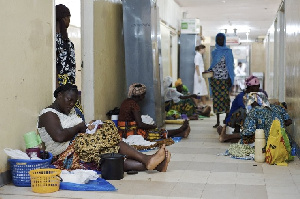 File photo of some pregnant women and mothers and their babies being treated on the floor
File photo of some pregnant women and mothers and their babies being treated on the floor
A new Afrobarometer Sustainable Development Goal (SDG) Scorecard for Ghana shows that the country is making progress on trust in state institutions as well as access to clean water/sanitation and affordable energy.
But it is doing worse on access to medical care, reducing the gender gap in unemployment, and reducing bribe payment for public services.
The Afrobarometer SDG Scorecard, which provides citizens’ assessments of Ghana’s progress on important aspects of the United Nations Sustainable Development Goals, also shows that there has been no progress on reducing poverty and hunger and increasing public awareness or understanding of climate change.
It said progress toward gender equality is mixed: While gender equality in financial control is improving, trends in digital connection show stagnation and decline.
The newly-developed Afrobarometer SDG Scorecards highlight citizens’ experiences and evaluations of their country’s performance on democracy and governance, poverty, health, education, energy supply, water and sanitation, inequality, gender equity, and other priorities reflected in 12 of the 17 SDGs.
These citizen assessments can be compared to official UN tracking indicators.
They present both summary assessments for each SDG – via blue, green, yellow, and red “stoplights” – as well as the data behind these assessments.
Afrobarometer, an independent pan-African survey research network, released scorecards for five West African countries on Monday as part of a series of regional webinars focusing on progress toward the SDGs in Africa.
Speaking at the webinar, Daniel Armah-Attoh, Afrobarometer project manager for anglophone West Africa and North Africa, said the Afrobarometer SDG Scorecards are unique in highlighting the perspectives of ordinary citizens – the intended beneficiaries of the SDGs.
“The SDGs are intended to improve the lives of people, and numerous important indicators and scorecards are being used to track progress,” he said.
“Looking at how these citizen assessments compare or contrast with other SDG indicators should stimulate debate, help to identify gaps, and support action to move forward in each country.”
Afrobarometer SDG Scorecards for 31 countries are being released in May-July 2021. All scorecards can be accessed on the Afrobarometer website’s SDG Scorecards page.
Afrobarometer is a non-partisan African survey research network that provides reliable data on citizens’ experiences and evaluations of democracy, governance, and quality of life.
Seven rounds of surveys have been completed in up to 38 countries since 1999. Round 8 surveys (2019/2021) cover 34 countries.
Afrobarometer’s national partners in all regions of Africa conduct face-to-face interviews in the language of the respondent’s choice.
In the most recent survey in Ghana, the Ghana Center for Democratic Development (CDD-Ghana) interviewed a nationally representative, random, stratified probability sample of 2,400 adult citizens in September-October 2019.
A sample of this size yields country-level results with a margin of error of +/-2 percentage points at a 95% confidence level.